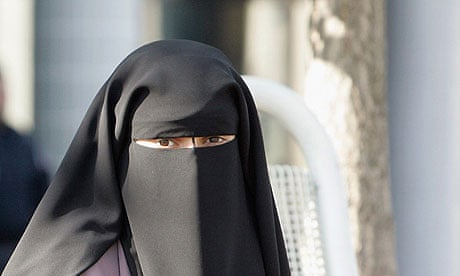A judge is to decide whether a Muslim woman should be allowed to stand trial while wearing a full-face veil.
Judge Peter Murphy is due to hand down written directions on Monday about whether the defendant, who says it is against her religious beliefs to show her face in public, will have to allow the jury and other people in court see her.
The 22-year-old from London, who cannot be identified for legal reasons, entered a not guilty plea to a charge of intimidation last week while wearing a niqab after the judge backed down from a previous decision that she would have to show her face to be properly identified.
Her barrister Susan Meek argued it would breach her human rights and be counter to Britain's tolerance of Islamic dress to remove her veil against her wishes when she stands trial at Blackfriars crown court in London.
The case has divided some human rights specialists.
James Welch, legal director of Liberty, said last week that the judge had been right to accept a plea from the woman while she was wearing a veil, delivering a "common-sense ruling that delivers both necessary identification and respect for the convictions of the defendant".
He added: "These matters require balance and ongoing discretion, but the UK has a long history of tolerance and is capable of setting an important example to others in Europe and beyond."
But the veteran human rights barrister John Cooper QC told the Sunday Telegraph that the woman should be told to remove her veil so the jury could see her face during evidence.
"I am of the opinion that the veil in a contested trial should be removed. A jury needs to not only listen to the evidence but see how it is delivered," he told the paper.
"This would set an unfortunate, dangerous precedent if this woman is allowed to hide her face from the jury."
The Metropolitan police constable, who was present when the defendant was photographed following her arrest in June, then swore on oath that it was the same woman under the niqab in the dock.
The only part of her face that was visible was a narrow horizontal stripe including her eyes.
Meek argued that the woman, from London, had a right to wear the veil during trial in November under article 9 of the European convention on human rights, which safeguards religious beliefs.
"She is entitled to wear it in private and in public," Meek said. "That right to wear the niqab also extends to the courtroom.
"There is no legislation in the UK in respect of the wearing of the niqab. There is no law in this country banning it."
She continued: "The jury will be able to determine her demeanour while wearing the veil.
"Demeanour is not just how their mouth moves, it is how their head moves, their eyes move, their hands move.
"That will be fully visible to the jury and no bar to her giving evidence."
